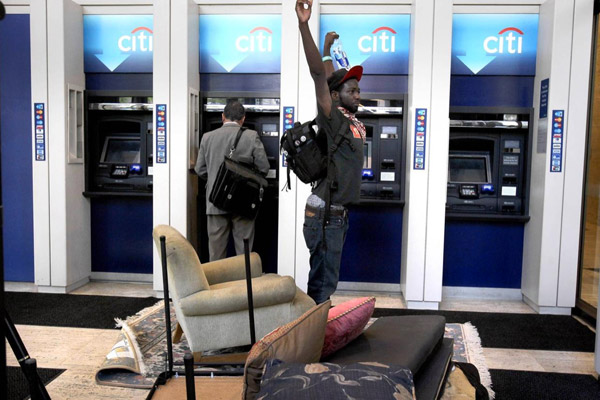Last weekend I went to see The Whole World Is Watching, a musical about the 1968 riots, that conveniently happened to premiere the week before the NATO summit. (Full disclosure: my brother-in-law wrote the music and co-wrote the book, which is the main reason I went.) The power of the theater is, in part, a peculiar type of realism: if done well, having real people portray characters, fictional or historical, can be more "real" than reading nonfictional accounts or watching archival footage because of its presence and immediacy. The Whole World Is Watching places the audience within the play, so the effect is even more heightened.
One of the actors is a well-cast doppleganger for Jerry Rubin, the activist-turned-businessman who was one of the more charismatic of the Chicago Eight, which didn't lack for charisma. And it got me thinking about how different the Occupy movement is. It doesn't really have leaders; of course, that's sort of the point. It also doesn't really have prominent, popular speakers or rhetoriticians. The 1968 protests had a core of brilliant speakers; it was a very performative movement. To the extent that Occupy has a prominent public intellectual, it's anthropolgist David Graeber, whose most recent work is a lengthy treatise on debt.
What does Occupy have? The name is a tell: it's as much about space, public and private, as anything else. It captured attention in the public fight over Zucotti Park in New York City, a private public space that made for an ideal conflict over property rights, possession, ownership, and habitation, issues not distant from Occupy Wall Street's emphasis on the relationship between money, government, and control.
So I was completely unsurprised to see that the first Occupy protest of NATO week was moving living-room furniture into a Citibank.

Along those lines, the great Barbara Ehrenreich has an essay about Occupy and homelessness as part of the new Economic Hardship Reporting Project:
In an economy where a centimillionaire could turn into a billionaire overnight, the poor and unwashed were a major buzzkill. Starting with Mayor Rudy Giuliani in New York, city after city passed “broken windows” or “quality of life” ordinances making it dangerous for the homeless to loiter or, in some cases, even look “indigent,” in public spaces.
[snip]
What occupiers from all walks of life are discovering, at least every time they contemplate taking a leak, is that to be homeless in America is to live like a fugitive. The destitute are our own native-born “illegals,” facing prohibitions on the most basic activities of survival.
Aaron Bady, one of my favorite bloggers, reflected on space from the perspective of Occupy Oakland:
There is nothing contradictory about the fact that Occupy Oakland has an amazon wishlist; this is a space being built in space, out of materials, and the fact that you must pay for materials to live in space with money is exactly the point. This is an attempt to create a space where something that was previously implausible could happen, but it still has to be done in that space.
The point is that, in such a space, the decision as to what constitutes a breach of this freedom is never yours to make. It’s the policeman who decides when your sitting becomes loitering, when your free speech becomes inflammatory, or when your right of assembly has transformed, through some bizarre alchemical process, into disorderly conduct.
I know I keep mentioning it again and again, but Tabatha Abu El-Haj's paper on "The Neglected Right of Assembly" is a great read for the historical perspective on protest and public space in America and how perception of it shifted.
Photograph: Chicago Tribune


